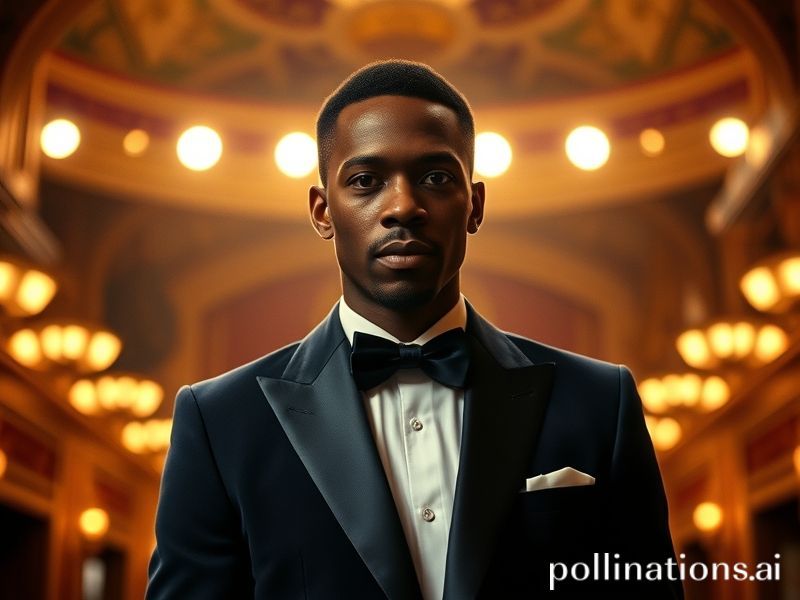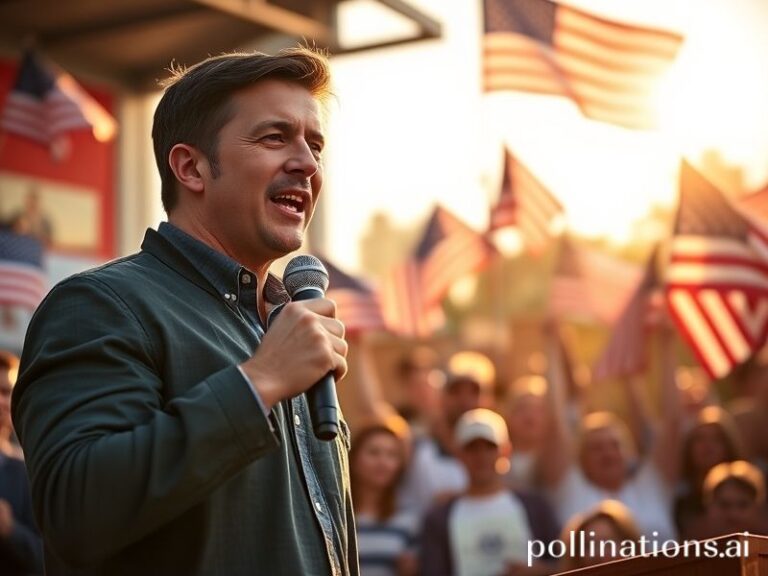Leslie Odom Jr.: America’s Velvet-Voiced Export in a World That Prefers Autotune
Leslie Odom Jr. and the Weaponized Charm of a Globalized Smoothie
You may know Leslie Odom Jr. as Aaron Burr’s velvet-voiced nemesis or as the guy whose Christmas album makes department-store Santas feel slightly inadequate. But step back from the Hamilton-branded snow globe and the guy starts looking less like a Broadway souvenir and more like a stealth export of twenty-first-century American soft power—equal parts jazz diplomacy, algorithmic charisma, and the faint scent of artisanal desperation.
Across four continents this year, Odom’s name has appeared in contexts that would make Alexander Hamilton’s powdered wig spin. In Seoul, a K-pop vocal coach uses Odom’s phrasing on “Wait For It” to teach emotional restraint to trainees who’ve been trained since birth to never wait for anything. In Lagos, a fintech billboard borrows his silhouette—tuxedo, hand delicately raised—to sell an app that promises to democratize wealth while quietly harvesting voiceprints. Meanwhile, in a Berlin U-Bahn station, commuters too cool for hope still pause when “Go Crazy” leaks from someone’s headphones, because the man’s vibrato is apparently kryptonite to Teutonic cynicism.
The joke, of course, is that none of this is accidental. America long ago realized its most lethal exports aren’t aircraft carriers but vibes. Odom—Grammy and Tony in tow—delivers the vibes pre-mixed, bottled, and carbon-neutral. The Department of Commerce doesn’t need to slap a tariff on his sincerity; Spotify does the heavy lifting, algorithmically slipping him between Bad Bunny and BTS until resistance feels like xenophobia with a playlist disorder.
Yet there’s something almost admirably guileless about the way Odom plays the game. While other entertainers monetize trauma like it’s NFT real estate, he sticks to the old-school model: practice, rehearsal, gratitude. It’s retro enough to feel radical, which may explain why global audiences—exhausted by influencers who cry on cue—treat him as a palate cleanser. In Tokyo last spring, a pop-up cocktail bar served the “Odom Old-Fashioned” (maple, smoke, and a spoken-word apology for colonialism). Patrons left tips in three currencies, none of them dollars.
Still, the cynic in me notes how neatly he fits the emerging archetype: the post-racial, post-genre, post-irony entertainer whose very existence lets streaming services check three ESG boxes at once. Watch him glide through a Paris awards show, trilingual acceptance speech tucked behind one ear, and you realize he’s the living embodiment of a McKinsey deck titled “Global Sentiment Optimization via Multicultural Crooners.” The French press calls him “le roi du cool,” apparently forgetting that cool was once a threat to the establishment, not its in-house Spotify blend.
And yet, when Odom steps to a Steinway in Cape Town to honor the late Hugh Masekela with a version of “Stardust,” the room forgets to be ironic. For four minutes, colonial ghosts, post-apartheid hangovers, and crypto-bros alike fall under the same spell. You can almost hear the global balance of payments recalibrate: cultural capital flowing south for once, carried on a breeze of major-seventh chords and the unspoken agreement that beauty, however packaged, still counts as contraband in a world that weaponizes ugliness for clicks.
That, finally, may be the international significance of Leslie Odom Jr. in the roaring 2020s. He is not a savior—those tend to disappoint—but a highly efficient reminder that the empire’s last sustainable resource is its ability to make strangers feel briefly, inexplicably, like neighbors. If the planet is indeed a sinking cruise ship, he’s the lounge act who keeps the band playing just long enough for the lifeboats to deploy with a decent soundtrack. Whether that’s heroic or merely good branding depends, as always, on which deck you’re standing on when the iceberg arrives.







